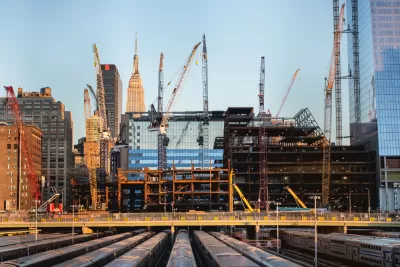The city’s ambitious ‘City of Yes’ zoning reform plan requires a broad array of sometimes controversial policy changes.

The Manhattan Institute’s Eric Kober examines New York City’s City of Yes for Housing Opportunity (COH) zoning reform proposal, which is being described as a ‘moonshot’ effort to significantly boost the city’s housing supply in a decade.
A half-million new housing units over a decade translates into 50,000 units each year, a level not reached since the early 1960s—and then, for only a few years.
Attempting to answer the question of what policies can help the city achieve its ambitious goal, Kober notes that enacting the CHO is just one piece of a larger puzzle, pointing out that zoning regulations in 1961 were far more attuned to the potential for rapid population growth and a surge in housing demand. Kober recommends “far more permissive” zoning that accommodates changing demand mirroring the 1961 policies, as well as “rational and consistent” taxation of residential properties, and rent control policies that are sensitive to their impacts on new construction.
However, “Many of these reforms represent daunting political hurdles, and change won’t happen quickly. An optimistic scenario is that NYC will see incremental reforms, and housing construction will creep up.” While the mayor’s goal of 500,000 new housing units may be out of reach, it provides an aspirational target that could move the needle on the city’s housing crisis.
FULL STORY: What Would New York City’s Housing “Moonshot” Look Like?

Alabama: Trump Terminates Settlements for Black Communities Harmed By Raw Sewage
Trump deemed the landmark civil rights agreement “illegal DEI and environmental justice policy.”

Study: Maui’s Plan to Convert Vacation Rentals to Long-Term Housing Could Cause Nearly $1 Billion Economic Loss
The plan would reduce visitor accommodation by 25% resulting in 1,900 jobs lost.

Planetizen Federal Action Tracker
A weekly monitor of how Trump’s orders and actions are impacting planners and planning in America.

Wind Energy on the Rise Despite Federal Policy Reversal
The Trump administration is revoking federal support for renewable energy, but demand for new projects continues unabated.

Passengers Flock to Caltrain After Electrification
The new electric trains are running faster and more reliably, leading to strong ridership growth on the Bay Area rail system.

Texas Churches Rally Behind ‘Yes in God’s Back Yard’ Legislation
Religious leaders want the state to reduce zoning regulations to streamline leasing church-owned land to housing developers.
Urban Design for Planners 1: Software Tools
This six-course series explores essential urban design concepts using open source software and equips planners with the tools they need to participate fully in the urban design process.
Planning for Universal Design
Learn the tools for implementing Universal Design in planning regulations.
Caltrans
Smith Gee Studio
Institute for Housing and Urban Development Studies (IHS)
City of Grandview
Harvard GSD Executive Education
Toledo-Lucas County Plan Commissions
Salt Lake City
NYU Wagner Graduate School of Public Service





























